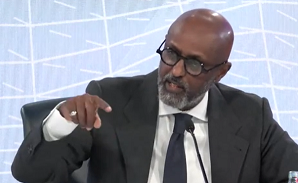BY YANET FANTAYE WOGAYEHU – Sub Saharan Africa’s economic growth is set to slow in 2025 and next year mainly due to the surge of global policy uncertainty, says the International Monetary Fund (IMF).
“Just when policy efforts began to bear fruit, with regional growth exceeding expectations in 2024, the region’s hard-won recovery has been overtaken by a sudden realignment of global priorities, casting a shadow over the outlook. We now expect growth in Sub-Saharan Africa to ease to 3.8 percent in 2025 and 4.2 percent in 2026, marked down from our October projections, and these have been driven largely by difficult external conditions: weaker demand abroad, softer commodity prices, and tighter financial markets,” said Abebe Aemro Selassie, Director of the IMF’s African Department.
He made the remark over the weekend at the IMF/WB Spring Meetings in Washington DC while releasing April Regional Economic Outlook for Sub-Saharan Africa. Any further increase in trade tensions or tightening of financial conditions in advanced economies could further dampen regional confidence, raise borrowing costs further, and delay investment. Meanwhile, official development assistance to Sub-Saharan Africa is likely to decline further, placing extra strain on the most vulnerable population.
He stated that “these external headwinds come on top of longer-standing vulnerabilities. High debt levels constrain the ability of many countries to finance essential services and development priorities. While inflationary pressures have moderated at the regional level, quite a few countries are still grappling with elevated inflation, necessitating a tighter monetary stance and careful fiscal policy.”
“Against this challenging backdrop, our report underscores the importance of calibrating policies to balance growth, social development, and macroeconomic stability. Building robust fiscal and external buffers is more important than ever, underpinned by credibility and consistency in policymaking.”
“In particular, there is a premium on policies to strengthen resilience: mobilize domestic revenue, improve spending efficiency, and strengthen public finance management and fiscal framework and fiscal frameworks to lower borrowing costs. Reforms that enhance growth, improve the business climate, and foster regional trade integration are also needed to lay the groundwork for private sector-led growth. High growth is imperative to engender the millions of jobs our region needs,” Mr. Abebe said.
“A strong, stable, and prosperous Sub-Saharan Africa is important for its people but also the world. It is the region that will be the main source of labor and incremental investment and consumption demand in the decades to come. External support as the region goes through its demographic transition is of tremendous strategic importance for the future of our planet.”
He stated that the IMF is doing its part to help, having dispersed over $65 billion since 2020 and more than $8 billion just over the last year. “Our policy advice and capacity development efforts support more countries still,” Abebe said.

